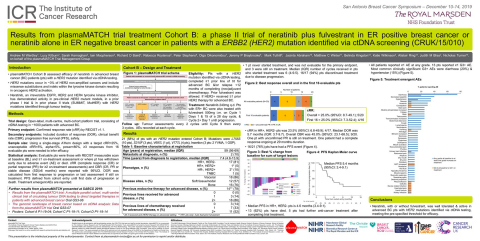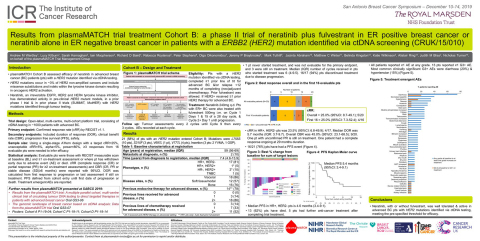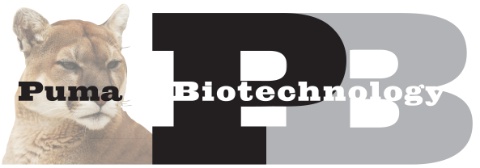LOS ANGELES--(BUSINESS WIRE)--Puma Biotechnology, Inc. (Nasdaq: PBYI), a biopharmaceutical company, announced that its collaborators at The Institute of Cancer Research, London, presented results from the cohort of patients in the plasmaMATCH trial treated with Puma's drug neratinib at the 2019 San Antonio Breast Cancer Symposium (SABCS) in San Antonio, Texas. The oral presentation entitled, “Results from the plasmaMATCH trial: A multiple parallel cohort, multi-centre clinical trial of circulating tumour DNA testing to direct targeted therapies in patients with advanced breast cancer (CRUK/15/010),” and the poster presentation entitled, “Results from plasmaMATCH trial treatment Cohort B: A phase II trial of neratinib plus fulvestrant in ER positive breast cancer or neratinib alone in ER negative breast cancer in patients with a ERBB2 (HER2) mutation identified via ctDNA screening (CRUK/15/010)” were presented by Professor Nicholas Turner, M.D., Ph.D., Professor of Molecular Oncology at The Institute of Cancer Research (ICR) and Consultant Medical Oncologist at The Royal Marsden NHS Foundation Trust, who is the principal investigator of the plasmaMATCH trial, and Andrew M. Wardley, M.D., consultant medical oncologist at The Christie NHS Foundation Trust in Manchester, England and Medical Director of the National Institute for Health Research (NIHR) Manchester Clinical Research Facility at The Christie, respectively. The plasmaMATCH trial was funded by Cancer Research UK.
The plasma-based Molecular profiling of Advanced breast cancer to inform Therapeutic Choices (plasmaMATCH) trial is a phase IIa, multiple parallel cohort, open-label, multicentre trial in patients with advanced breast cancer, which aims to assess whether analyzing a blood sample for circulating tumor DNA (ctDNA) could provide an alternative to biopsies for identifying the genetic mutations present in advanced breast cancer and whether subgroups of patients with advanced breast cancer, identified through ctDNA screening, may benefit from a treatment targeting their type of cancer.
Approximately 1,044 patients with advanced breast cancer from approximately 20 sites in the United Kingdom registered for the trial and ctDNA results were available for 1,033 (98.9%) of the patients. Depending on the results of the ctDNA screening, patients were enrolled in one of five treatment cohorts and received therapy to target their type of breast cancer. Patients with HER2 mutations were enrolled in the cohort of patients who received either neratinib monotherapy (for patients with hormone receptor negative disease) or neratinib in combination with fulvestrant (for patients with hormone receptor positive disease). Twenty-one patients with HER2 mutations were enrolled in the cohort and 20 patients were evaluable for the primary endpoint of the trial, which was confirmed objective response rate as determined by RECIST 1.1 assessed by the investigator.
In the HER2-mutant cohort, 18 (86%) of the 21 patients had hormone receptor positive breast cancer, 18 patients (86%) had visceral disease, 18 patients (86%) had received prior chemotherapy for metastatic disease, and 11 patients (52%) had received two or more prior lines of chemotherapy for metastatic disease.
The efficacy results from the trial showed that for the 20 efficacy evaluable patients, 5 patients (25%) experienced a confirmed objective response, and three further patients had unconfirmed responses. The median duration of response was 5.7 months, and the median progression free survival in this cohort of patients was 5.4 months.
Prof. Nicholas Turner, Professor of Molecular Oncology at The Institute of Cancer Research, London, and Consultant Medical Oncologist at The Royal Marsden NHS Foundation Trust, said, “Somatic HER2 mutations can be readily and accurately identified from ctDNA blood samples and are clinically actionable for targeted therapy in metastatic breast cancers. The combination of neratinib plus fulvestrant therapy demonstrates encouraging clinical activity with durable responses in this heavily pretreated metastatic breast cancer patient population with HER2-mutated disease.”
Alan H. Auerbach, Chief Executive Officer and President of Puma Biotechnology, added, “We are very pleased with the activity seen in this cohort of patients with HER2-mutated breast cancer with neratinib in plasmaMATCH. This data correlates with the data observed in the neratinib plus fulvestrant arm of the SUMMIT trial, and we look forward to the further development of the combination of neratinib plus trastuzumab plus fulvestrant in this patient population.”
About The Institute of Cancer Research
The Institute of Cancer Research, London, is one of the world's most influential cancer research organisations.
Scientists and clinicians at The Institute of Cancer Research (ICR) are working every day to make a real impact on cancer patients' lives. Through its unique partnership with The Royal Marsden NHS Foundation Trust and 'bench-to-bedside' approach, the ICR is able to create and deliver results in a way that other institutions cannot. Together the two organisations are rated in the top centres for cancer research and treatment globally.
The ICR has an outstanding record of achievement dating back more than 100 years. It provided the first convincing evidence that DNA damage is the basic cause of cancer, laying the foundation for the now universally accepted idea that cancer is a genetic disease. Today it is a world leader at identifying cancer-related genes and discovering new targeted drugs for personalised cancer treatment.
A college of the University of London, the ICR is the UK’s top-ranked academic institution for research quality and provides postgraduate higher education of international distinction. It has charitable status and relies on support from partner organisations, charities and the general public.
The ICR's mission is to make the discoveries that defeat cancer. For more information visit http://www.icr.ac.uk.
About Puma Biotechnology
Puma Biotechnology, Inc. is a biopharmaceutical company with a focus on the development and commercialization of innovative products to enhance cancer care. Puma in-licenses the global development and commercialization rights to PB272 (neratinib, oral), PB272 (neratinib, intravenous) and PB357. Neratinib, oral was approved by the U.S. Food and Drug Administration in July 2017 for the extended adjuvant treatment of adult patients with early stage HER2-overexpressed/amplified breast cancer, following adjuvant trastuzumab-based therapy, and is marketed in the United States as NERLYNX® (neratinib) tablets. NERLYNX was granted marketing authorization by the European Commission for the extended adjuvant treatment of hormone receptor-positive HER2-positive early stage breast cancer in August 2018. NERLYNX is a registered trademark of Puma Biotechnology, Inc.
Important Safety Information Regarding NERLYNX® (neratinib) U.S. Indication
NERLYNX® (neratinib) tablets, for oral use
INDICATIONS AND USAGE: NERLYNX is a kinase inhibitor indicated for the extended adjuvant treatment of adult patients with HER2 overexpressed/amplified breast cancer, to follow adjuvant trastuzumab-based therapy.
CONTRAINDICATIONS: None
WARNINGS AND PRECAUTIONS:
- Diarrhea: Aggressively manage diarrhea occurring despite recommended prophylaxis with additional antidiarrheals, fluids, and electrolytes as clinically indicated. Withhold NERLYNX in patients experiencing severe and/or persistent diarrhea. Permanently discontinue NERLYNX in patients experiencing Grade 4 diarrhea or Grade ≥ 2 diarrhea that occurs after maximal dose reduction.
- Hepatotoxicity: Monitor liver function tests monthly for the first 3 months of treatment, then every 3 months while on treatment and as clinically indicated. Withhold NERLYNX in patients experiencing Grade 3 liver abnormalities and permanently discontinue NERLYNX in patients experiencing Grade 4 liver abnormalities.
- Embryo-Fetal Toxicity: NERLYNX can cause fetal harm. Advise patients of potential risk to a fetus and to use effective contraception.
ADVERSE REACTIONS: The most common adverse reactions (≥ 5%) were diarrhea, nausea, abdominal pain, fatigue, vomiting, rash, stomatitis, decreased appetite, muscle spasms, dyspepsia, AST or ALT increase, nail disorder, dry skin, abdominal distention, weight decreased and urinary tract infection.
To report SUSPECTED ADVERSE REACTIONS, contact Puma Biotechnology, Inc. at 1-844-NERLYNX (1-844-637-5969) and www.NERLYNX.com or FDA at 1-800-FDA-1088 or www.fda.gov/medwatch.
DRUG INTERACTIONS:
- Gastric acid reducing agents: Avoid concomitant use with proton pump inhibitors. When patients require gastric acid reducing agents, use an H2-receptor antagonist or antacid. Separate NERLYNX by at least 3 hours with antacids. Separate NERLYNX by at least 2 hours before or 10 hours after H2-receptor antagonists.
- Strong or moderate CYP3A4 inhibitors: Avoid concomitant use.
- Strong or moderate CYP3A4 inducers: Avoid concomitant use.
- P-glycoprotein (P-gp) substrates: Monitor for adverse reactions of narrow therapeutic agents that are P-gp substrates when used concomitantly with NERLYNX.
USE IN SPECIFIC POPULATIONS:
- Lactation: Advise women not to breastfeed.
Please see Full Prescribing Information for additional safety information.
The recommended dose of NERLYNX is 240 mg (six 40 mg tablets) given orally once daily with food, continuously for one year. Antidiarrheal prophylaxis should be initiated with the first dose of NERLYNX and continued during the first 2 months (56 days) of treatment and as needed thereafter.
To help ensure patients have access to NERLYNX, Puma has implemented the Puma Patient Lynx support program to assist patients and healthcare providers with reimbursement support and referrals to resources that can help with financial assistance. More information on the Puma Patient Lynx program can be found at www.NERLYNX.com or 1-855-816-5421.
Further information about Puma Biotechnology may be found at www.pumabiotechnology.com.
Forward-Looking Statements
This press release contains forward-looking statements. All forward-looking statements involve risks and uncertainties that could cause Puma’s actual results to differ materially from the anticipated results and expectations expressed in these forward-looking statements. These statements are based on current expectations, forecasts and assumptions, and actual outcomes and results could differ materially from these statements due to a number of factors, which include, but are not limited to, the risk factors disclosed in the periodic and current reports filed by Puma with the Securities and Exchange Commission from time to time, including the Company’s Annual Report on Form 10-K for the year ended December 31, 2018. Readers are cautioned not to place undue reliance on these forward-looking statements, which speak only as of the date hereof. Puma assumes no obligation to update these forward-looking statements, except as required by law.




